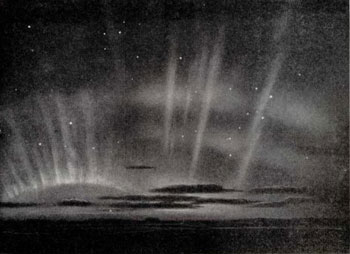Why Could The Fire Of The Final Conflagration Not Just As Easily Consume The Whole Universe, Rather Than Simply 'Earth?"
In Greek mythology Phaeton was the son of Helios, the sun-god. Helios drove his golden chariot, a 'quadriga' yoked to a team of four horses abreast, daily across the sky. Phaeton persuaded his unwilling father to allow him for one day to drive his chariot across the skies. Because he had no skill he was soon in trouble, and the climax came when he met the fearful Scorpion of the zodiac. He dropped the reins, the horses bolted and caused the earth itself to catch fire. In the nick of time Jupiter, father of the goods, put a stop to his escapade with a thunderbolt which wrecked the chariot and sent Phaeton hurtling down in flames into the River Eridanus (according to some, the Po). He was buried by nymphs. Phaetons's reckless attempt to drive his father's chariot made him the symbol of all who aspire to that which lies beyond their capabilities.Web Gallery of Art
John has a question on the post for Sunday, December 6, 2009: The Twin Voyager Spacecrafts Will One Day Return To The Earth ~ St. Thomas Aquinas
"I find the assertion that "Voyager spacecraft will return to earth" a bit sensationalistic, and a bit like putting a muzzle on God's works. We've done something, now it's like we're daring God to fulfill his promise by 'bringing them back." Why could the cleansing fire not just as easily consume the whole universe, rather than simply 'Earth?" That would be more logical, anyway... "
St Thomas Aqunias has already answered the question on whether the fire will cleanse also the higher heavens?
First the Objection (John’s view):
Objection 1: It would seem that that fire will cleanse also the higher heavens. For it is written (Ps. 101:26, 27): "The heavens are the works of Thy hands: they shall perish but Thou remainest." Now the higher heavens also are the work of God's hands. Therefore they also shall perish in the final burning of the world.
Now for the answer of St. Thomas Aquinas:
On the contrary, "The heavenly bodies are not receptive of impressions from without" [*Cf. Sent. Philosop. ex Arist. collect. lit. c.---Among the works of Bede].
Further, a gloss on 2 Thess. 1:8, "In a flame of fire giving vengeance," says: "There will be in the world a fire that shall precede Him, and shall rise in the air to the same height as did the waters of the deluge." But the waters of the deluge did not rise to the height of the higher heavens but only 15 cubits higher than the mountain summits (Gn. 7:20). Therefore the higher heavens will not be cleansed by that fire.
I answer that, The cleansing of the world will be for the purpose of removing from bodies the disposition contrary to the perfection of glory, and this perfection is the final consummation of the universe: and this disposition is to be found in all bodies, but differently in different bodies. For in some this indisposition regards something inherent to their substance: as in these lower bodies which by being mixed together fall away from their own purity. In others this indisposition does not regard something inherent to their substance; as in the heavenly bodies, wherein nothing is to be found contrary to the final perfection of the universe, except movement which is the way to perfection, and this not any kind of movement, but only local movement, which changes nothing intrinsic to a thing, such as its substance, quantity, or quality, but only its place which is extrinsic to it. Consequently there is no need to take anything away from the substance of the higher heavens, but only to set its movement at rest. Now local movement is brought to rest not by the action of a counter agent, but by the mover ceasing to move; and therefore the heavenly bodies will not be cleansed, neither by fire nor by the action of any creature, but in lieu of being cleansed they will be set at rest by God's will alone.
See other related posts:
Wednesday, January 27, 2010
NASA Mars Exploration Rover Will One Day To Return To Place Of Origin ~ St. Thomas Aquinas
Saturday, January 23, 2010
Saturn’s Sixth Ellipsoidal Moon Titan Shall One Day Be Moved From Its Proper Orbit And Be Cast To the Earth ~ St. Thomas Aquinas
Wednesday, January 13, 2010
Earth To Have Near-Miss Tonight From Mystery Object Janurary 13, 2009 & All Spacecraft Will One Day Return to Earth ~ St. Thomas Aquinas







Comments
Post a Comment